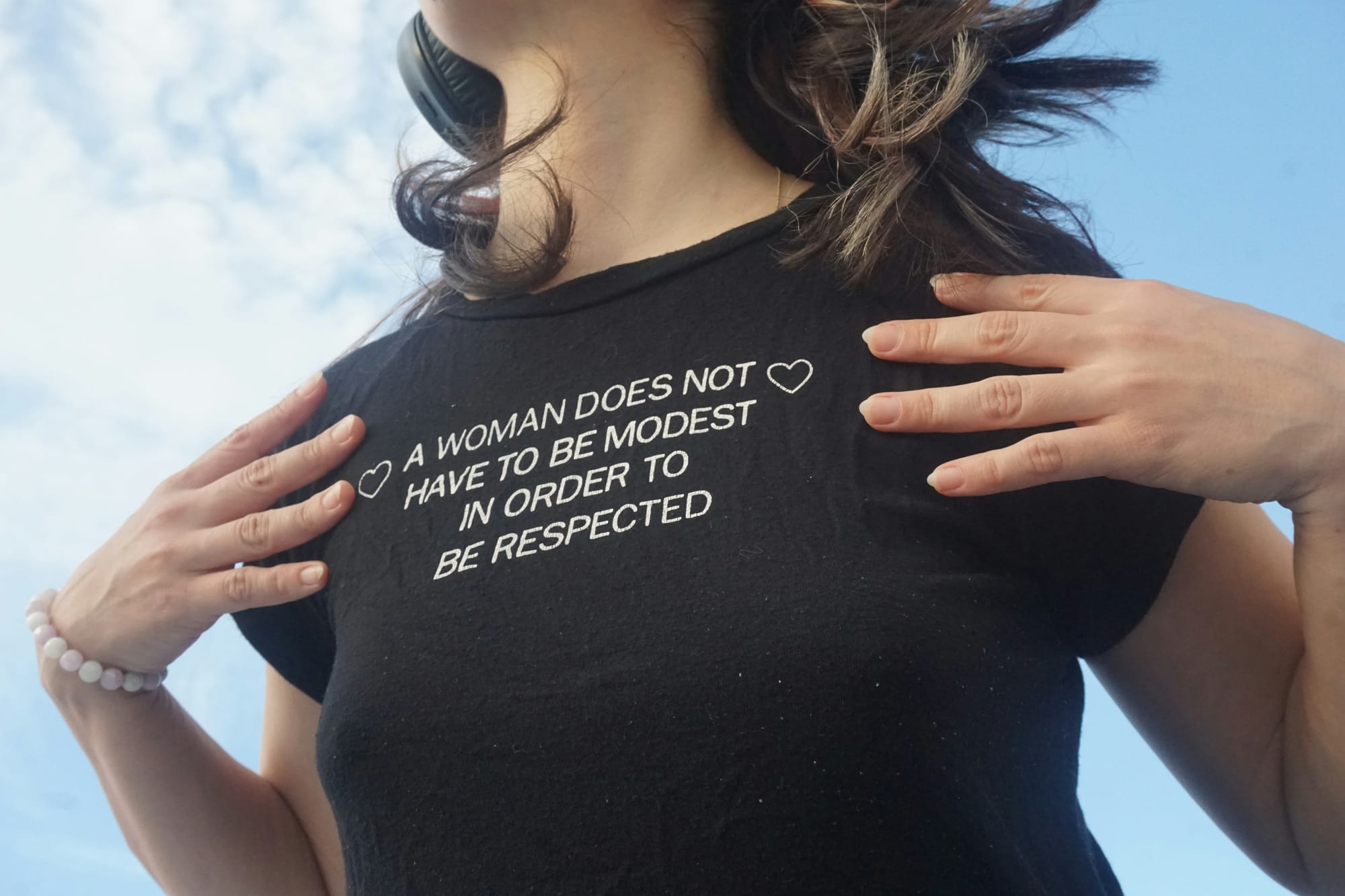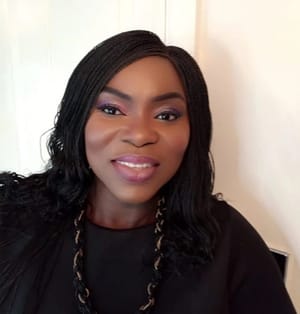Every week, as I co-host The G-Spot, a talk show on G-Woman Radio, "where Genius Meets Global Gamechanger," my co-hosts and I have the privilege of interviewing some truly amazing and accomplished women. One of my favourite moments on the show is when I get to ask our genius, gamechanging guests each week to discuss and bust myths and misconceptions surrounding their work. Without exception, every single guest embraces this question with enthusiasm, eager to delve into the realities of their experiences. As I listen to their passionate responses week after week, I increasingly realise that myths, if left unchallenged and unaddressed, can morph into commonly accepted truths - despite being unfounded and baseless. That’s why I’ve decided to explore some pervasive myths about women and womanhood in this article. My hope is that this exploration will come across as enlightening and empowering, while sparking meaningful conversations about the true essence of womanhood in today’s world.
Opening Thoughts: Why Myths Matter
Myths play a pivotal role in shaping societal perceptions, influencing how women view themselves and others. These often unfounded beliefs can cloud judgment, limit opportunities, and perpetuate stereotypes that confine us to narrow definitions of identity. When it comes to women and womanhood, these myths can create a narrative that can lead to damaging assumptions about our capabilities, our roles, and our emotional responses. Understanding why myths matter enables us to confront and challenge these stereotypes (and the narratives behind them), fostering a deeper awareness of the diverse experiences we encounter as women. Like it or not, addressing these misconceptions is important, not just to correct inaccuracies, but more to empower women to embrace their authentic selves and encourage society to celebrate the richness of our varied personalities and identities. Every myth we eliminate paves the way for a more inclusive and equitable society, where every woman is free to define her own path, own her story, and thrive in her uniqueness.
We can start by admitting that women are complex creatures, no doubt, who navigate and experience the world through multiple perspectives and filters. Adding the burden of unfounded myths to the mix can create inner conflict, distort reality, limit potential, and overshadow achievements for most women. In trying to understand the complexities of womanhood, we must look beyond societal labels to uncover “the truth about women” - and this would require us to unpack long-standing myths so we can discover the realities of the modern woman as she struggles to navigate a rapidly changing world. This may well be the time for women to “break the mold", redefine their roles, and challenge the stereotypes that have historically constrained them, in order to inspire new perspectives on gender equality.

Five Common Myths About Women & Womanhood - and the Studies that Unravel Them:
So let’s explore 5 random but common myths about women and womanhood that persist today, shedding some light on their impact, unravelling the misconceptions and revealing the realities that challenge or debunk them:
Myth 1: Women Are Naturally Nurturing
The Impact: While nurturing is a valued trait, this myth perpetuates stereotypes that women must prioritize caregiving roles. It suggests that women have an inherent nurturing instinct, making them better caregivers than men. By labelling women as "natural mothers" or caregivers, this myth suggests that all women have an inherent nurturing instinct, making them better caregivers than men. This can challenge women's diverse capabilities and limit their right to make choices beyond traditional roles. It can therefore potentially harm women’s career opportunities, pressuring them to conform to traditional roles.
The Reality: A 2015 study published in "Psychological Bulletin" reviewed multiple studies on gender differences in nurturing behaviour. It found that while women may be socialised to exhibit more nurturing behaviour, individual differences play a significant role, thus debunking the notion of innate nurturing instincts.
Myth 2: Women Are Poor Drivers
The Impact: This stereotypical myth not only undermines women's diverse range of skills but also reflects broader societal biases, and this can limit the concept of gender equality. This stereotype paints women as less competent behind the wheel, often leading to negative biases in both social and professional contexts. Resulting in far-reaching effects, this myth can perpetuate dangerous driving situations, affect insurance rates for women, and could potentially contribute to gender discrimination in automotive-related industries.
The Reality: A 2010 study from the University of California, Berkeley, analysed accident data and found that women are involved in fewer accidents than men. The research showed that women are actually generally more cautious drivers, suggesting the stereotype is unfounded.
Myth 3: Women Are More Emotional Than Men
The impact: This myth can appear to be labelling women as overly emotional/irrational and can thus potentially dismiss their voices and contributions, particularly in professional, corporate or political settings, since gender norms often dictate what is deemed to be acceptable emotional expression. For career women, this can lead to misunderstandings in workplaces where women face being labelled as “overly emotional”. Labelling emotions as a weakness can hinder women's advancement, perpetuating environments where emotional intelligence is undervalued, much to the detriment of both genders.
The Reality: In 2015, research published in the journal "Emotion", a peer‑reviewed psychology publication published by the American Psychological Association (APA) examined gender differences in emotional responses. The study found that while men and women exhibit different emotional expressions, both genders experience emotions similarly. This indicates that the belief that women are more emotional is oversimplified and therefore misleading.
Myth 4: Feminism is Anti-Men
The Impact: Based on this myth, many people associate feminism with hostility towards men, which misrepresents the fact and encourages a lack of understanding about the true meaning of feminism and indeed, its benefits for everyone, across genders. This myth suggests that feminism seeks to elevate women at the expense of men, a false notion that is often used to discredit feminist movements. It can lead to misunderstanding and resistance to gender equality initiatives, alienating potential male allies and stigmatising pro-feminist views.
The Reality: A study published in "Psychology of Men & Masculinity" in 2013 found that men who identified as feminists reported higher levels of empathy and understanding toward women. Also, Michael Kimmel’s work, particularly in “The Gendered Society” (2016), highlights how patriarchy harms both women and men by enforcing rigid roles that limit emotional expression, caregiving, and identity. Far from being anti-men, feminism advocates for men’s right to be vulnerable, to parent more freely, and to escape restrictive stereotypes. These studies counter the notion that feminism is against men, highlighting that it can promote positive beliefs about gender equity for all, and create a healthier, more authentic society for all genders.
Myth 5: Women Can't Have It All
The Impact: This myth is founded on the idea that women must choose between fulfilling career success and a happy family life, suggesting that success in one comes at the expense of the other. This can create feelings of inadequacy for women, fostering self-doubt and guilt whenever women strive to pursue both. Like a self-fulfilling prophecy, it can lead to burnout and stress for those trying to balance multiple roles. All of this can lead to subtle pressures on women, to see ambition and nurturing as mutually exclusive, rather than as complementary facets of a rich, multidimensional life.
The Reality: Research shows that the pervasive belief that women must choose between career success and family life is a myth rooted more in structural barriers than personal limitation. In 2020, research conducted by McKinsey & Company in their "Women in the Workplace" report revealed that women can balance successful careers and family life. The study highlighted that providing support systems, such as flexible working hours and parental leave, can significantly help women (and men) manage both aspects successfully. This debunks the myth and highlights that systemic change - not sacrificing career ambition - is the real solution.

Breaking the Cycle: Practical Ways to Challenge Myths and Stereotypes:
It would be incomplete to explore the myths and stereotypes surrounding women and womanhood without also offering some strategies to dismantle them. From education and policy reform to storytelling and allyship, here are some practical, actionable approaches we can all support to break the cycle and foster a more equitable narrative:
1. Education and Awareness Campaigns
. Develop programs that challenge gender biases and stereotypes from an early age. Workshops, school curricula, and community seminars can spark critical thinking, empathy, and meaningful dialogue that endures over time. By normalising conversations about equality early, we equip future generations to recognise and question stereotypes rather than accept them - planting seeds for a more inclusive society.
2. Representation in Media
. Advocate for authentic and diverse portrayals of women across film, television, and advertising - in short, let women write their own scripts, curate their own content, and tell their own stories. Media holds immense power to reshape perceptions by showcasing women as leaders, innovators, and multidimensional human beings. Women-owned media organisations, in particular, can shift the culture of male-dominated narratives by centering female perspectives. Greater influence, authority, and decision-making power for women in media - as well as outright ownership of media platforms and media organisations - are crucial steps forward. Encouragingly, a women-owned global multimedia organisation like G-Woman Media Inc. is already leading the way by giving women wealth, worth and true legal ownership.
3. Highlighting Success Stories
- Share authentic stories of women who break barriers in fields like science, technology, sports, and leadership. These narratives not only inspire but challenge deep-seated stereotypes by showing what’s truly possible. Celebrating these achievements publicly sends a clear message: women’s talents and ambitions belong everywhere.
4. Fostering Dialogue
- Create spaces - whether through forums, workshops, or community circles - where open and honest conversations about gender stereotypes can thrive. Dialogue nurtures empathy and invites people to question assumptions they may not even realise they hold. The more openly we talk about biases, the easier it becomes to dismantle them.
5. Promoting Gender Equality Policies
- Advocate for practical policies that advance equity in workplaces and schools, including flexible work arrangements, comprehensive parental leave, and equal pay. Such measures remove systemic barriers, enabling women to thrive personally and professionally without forced trade-offs. Lasting change often begins with policies that reflects our shared values.
6. Engaging Men as Allies
- Invite men to be active participants in conversations about gender equality and to challenge stereotypes both publicly and privately. When men recognise how these norms also limit them, they become powerful partners in driving change. Together, allyship can transform social expectations into shared responsibility.
7. Utilizing Social Media
- Harness the reach of platforms like Instagram, X (formerly Twitter), and Facebook to challenge stereotypes and spread empowering narratives. Creative campaigns, hashtags, and authentic storytelling can spark conversations that cross borders. By sharing diverse perspectives, we build momentum toward cultural shifts that matter.
8. Community Support Groups
- Establish and engage in networks and communities dedicated to mentorship, empowerment, and collective growth. These spaces offer women practical strategies, encouragement, and solidarity when confronting stereotypes. Strong communities remind us (and ensure) that no one has to navigate bias alone.
9. Encouraging Strategic Media Consumption
- Equip audiences with tools to question and critically assess how media portrays women. Recognising subtle stereotypes for what they are can help weaken their influence and encourage healthier representation. Media literacy and advocacy transforms passive consumers into active challengers of bias.
10. Collaborating with Organisations
- Partner with non-profits, advocacy groups, and other allies to advance gender equality initiatives. Collaboration amplifies reach, combines resources, and brings diverse expertise to shared goals. Together, collective action can accelerate meaningful and sustained change.
11. Implementing Diversity Training
- Promote diversity, equity, and inclusion training within organisations to address unconscious biases and foster inclusive environments. Such training helps reshape workplace culture, so that everyone feels valued and respected. Real transformation is only possible when awareness becomes daily practice.
12. Encouraging Emotional Expression
- Support emotional literacy and create spaces where all genders can express vulnerability and strength without judgement. Challenging the stigma around emotion benefits everyone, freeing people from narrow and limiting stereotypes. Ultimately, emotional honesty strengthens both the individual and their community as a whole.
By championing these strategies - from amplifying diverse stories and challenging media portrayals to engaging men as allies and advocating for systemic policy change - we can move from simply recognising stereotypes, to actively dismantling them. True transformation requires both individual and collective effort: the courage to question what we've been taught, the commitment to amplify under-represented voices, the willingness to allow women take the leading role in telling their own stories, and the vision to build a more inclusive narrative for women globally.
If it feels like women are standing at a pivotal crossroads, it is because we are! As we continue this journey, let us remember that meaningful change doesn’t happen overnight - but each conversation sparked, each story shared, and each barrier broken brings us closer to a world where every woman is seen, heard, and valued in all her complexity, a world where she is celebrated for every role she plays in the human ecosystem. Until then, we must continue the dismantling - one myth at a time - until we embrace a future grounded in authenticity, understanding, and respect for all women. Until then, we must continue to celebrate the diverse and multi-faceted realities of our lives, elevating our stories and our experiences above outdated stereotypes. In doing so, we not only empower ourselves here and now, but we also inspire future generations to boldly redefine what it means to be a woman in today’s world.
Dear women: our Call to Action is simple, and it is to each play our little part, in fostering a culture that honours the complexity and richness of womanhood in all its glory - a culture where every woman can thrive and express her true self, without apology.










